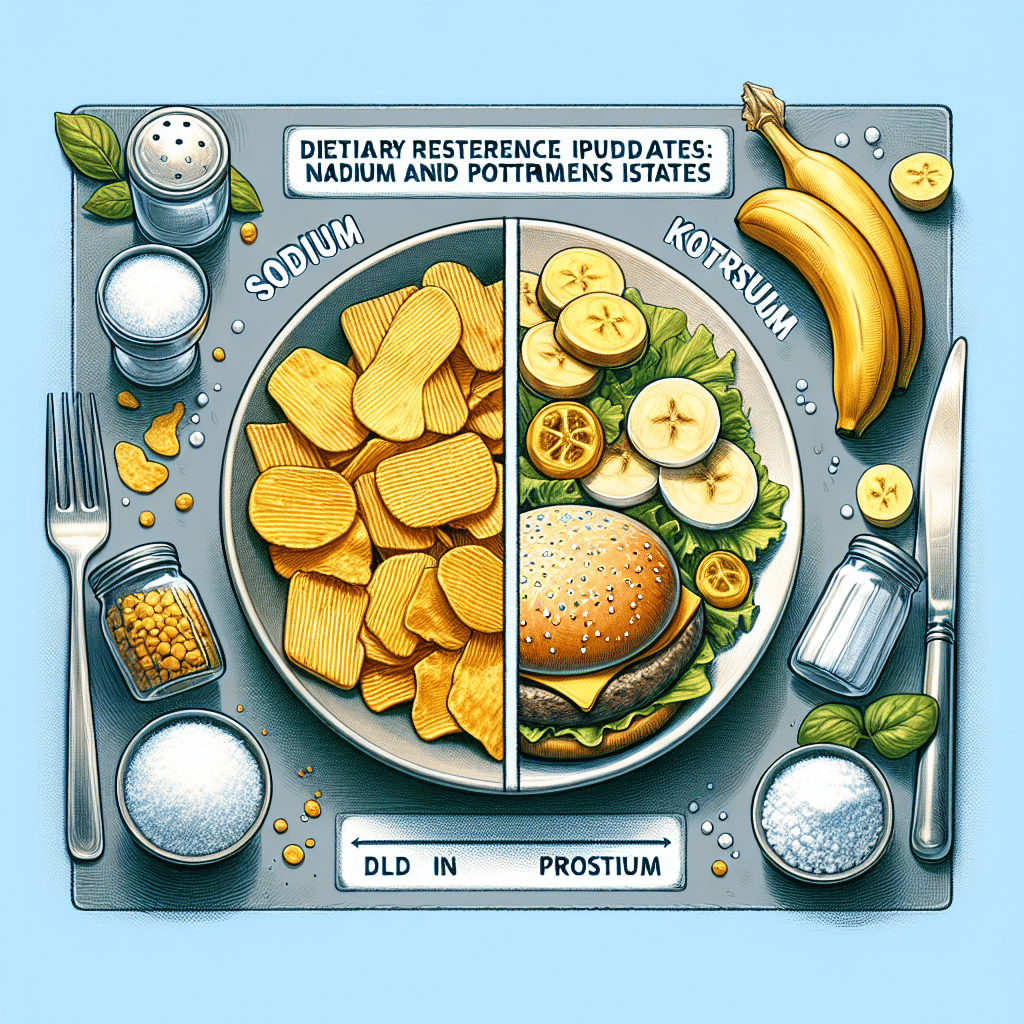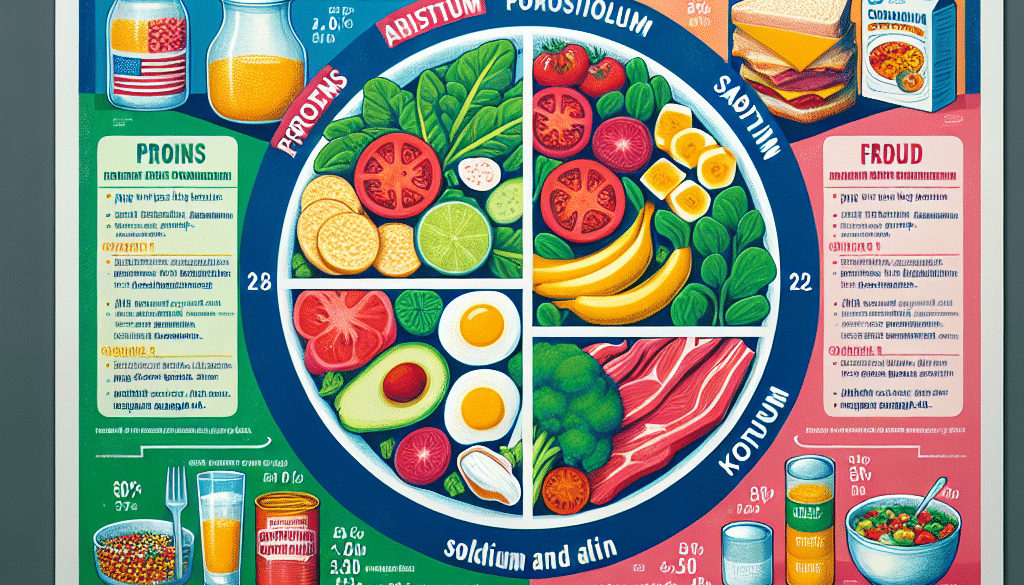Dietary Reference Updates: Sodium and Potassium’s New Intakes
-
Table of Contents
- Sodium and Potassium Intake: Latest Dietary Reference Updates
- The Importance of Sodium and Potassium in the Diet
- Recent Updates to Dietary Reference Intakes
- Updated Sodium Intake Recommendations
- Updated Potassium Intake Recommendations
- Implications for Public Health
- Case Studies and Statistics
- Strategies for Adjusting Sodium and Potassium Intake
- Reducing Sodium
- Increasing Potassium
- Conclusion: Embracing the New Dietary Reference Intakes
- Enhance Your Diet with ETprotein’s High-Quality Protein Products
Sodium and Potassium Intake: Latest Dietary Reference Updates

Understanding the importance of maintaining a balanced diet is crucial for overall health and well-being. Two essential minerals that play a significant role in this balance are sodium and potassium. Recent updates to dietary reference intakes (DRIs) for these minerals have sparked interest and discussion among health professionals and the general public alike. This article delves into the latest recommendations for sodium and potassium intake, exploring the implications for health and offering insights into how individuals can adjust their diets accordingly.
The Importance of Sodium and Potassium in the Diet
Sodium and potassium are electrolytes that are vital for numerous bodily functions. Sodium is critical for maintaining fluid balance, nerve function, and muscle contraction. However, excessive sodium intake is associated with high blood pressure and an increased risk of heart disease and stroke. On the other hand, potassium helps counteract the effects of sodium, aids in muscle function, and is beneficial for heart health. Balancing these two minerals is key to a healthy diet.
Recent Updates to Dietary Reference Intakes
The National Academies of Sciences, Engineering, and Medicine periodically review and update the DRIs based on the latest scientific evidence. The most recent updates reflect a comprehensive review of the roles that sodium and potassium play in health and disease prevention.
Updated Sodium Intake Recommendations
- The Adequate Intake (AI) for sodium has been slightly adjusted to reflect variations in age and gender.
- For adults, the AI is set at 1,500 mg per day, which is lower than previous recommendations.
- The Upper Limit (UL) for sodium remains at 2,300 mg per day, emphasizing the risk of consuming higher amounts.
Updated Potassium Intake Recommendations
- The AI for potassium has also been updated, with higher amounts recommended for adults: 2,600 mg per day for women and 3,400 mg per day for men.
- There is no UL for potassium from natural food sources, but caution is advised with supplements and potassium salts.
Implications for Public Health
The updated DRIs for sodium and potassium have significant implications for public health policies and nutrition education. With chronic diseases such as hypertension and cardiovascular disease being linked to dietary factors, these new guidelines serve as a benchmark for individuals and health professionals to aim for a healthier intake of these minerals.
Case Studies and Statistics
Several studies have demonstrated the benefits of reducing sodium intake and increasing potassium intake. For example, the DASH (Dietary Approaches to Stop Hypertension) diet, which is low in sodium and rich in potassium, has been shown to significantly lower blood pressure. Statistics from the Centers for Disease Control and Prevention (CDC) indicate that the average American consumes more than 3,400 mg of sodium per day, well above the recommended limits. This highlights the need for dietary changes across the population.
Strategies for Adjusting Sodium and Potassium Intake
Adapting to the new DRIs requires a conscious effort to modify dietary habits. Here are some strategies to help manage sodium and potassium intake:
Reducing Sodium
- Read nutrition labels to monitor sodium content in packaged foods.
- Choose fresh or frozen vegetables over canned varieties, which often contain added salt.
- Limit the use of high-sodium condiments and opt for herbs and spices to flavor food.
- Be mindful of sodium in restaurant meals and request dishes with less salt.
Increasing Potassium
- Incorporate a variety of fruits and vegetables into your diet, such as bananas, oranges, spinach, and sweet potatoes.
- Choose whole grains and legumes, which are good sources of potassium.
- Include low-fat dairy products or plant-based alternatives enriched with potassium.
- Opt for lean meats and fish, which contain natural potassium.
Conclusion: Embracing the New Dietary Reference Intakes
The updated DRIs for sodium and potassium represent a significant step towards improving public health. By understanding and implementing these new guidelines, individuals can make informed choices about their diet, potentially reducing the risk of chronic diseases. Health professionals play a crucial role in disseminating this information and supporting patients in making these dietary adjustments.
Enhance Your Diet with ETprotein’s High-Quality Protein Products
In addition to managing sodium and potassium intake, incorporating high-quality protein sources into your diet is essential for overall health. ETprotein offers a range of organic bulk vegan proteins that can complement your dietary needs. Their products, including organic rice protein, pea protein, and various seed proteins, are non-GMO, allergen-free, and feature a neutral taste, making them an excellent addition to any health-conscious diet.
About ETprotein:
ETprotein, a reputable protein and L-(+)-Ergothioneine (EGT) Chinese factory manufacturer and supplier, is renowned for producing, stocking, exporting, and delivering the highest quality organic bulk vegan proteins and L-(+)-Ergothioneine. They include Organic rice protein, clear rice protein, pea protein, clear pea protein, watermelon seed protein, pumpkin seed protein, sunflower seed protein, mung bean protein, peanut protein, and L-(+)-Ergothioneine EGT Pharmaceutical grade, L-(+)-Ergothioneine EGT food grade, L-(+)-Ergothioneine EGT cosmetic grade, L-(+)-Ergothioneine EGT reference grade and L-(+)-Ergothioneine EGT standard. Their offerings, characterized by a neutral taste, non-GMO, allergen-free attributes, with L-(+)-Ergothioneine purity over 98%, 99%, cater to a diverse range of industries. They serve nutraceutical, pharmaceutical, cosmeceutical, veterinary, as well as food and beverage finished product distributors, traders, and manufacturers across Europe, USA, Canada, Australia, Thailand, Japan, Korea, Brazil, and Chile, among others.
ETprotein specialization includes exporting and delivering tailor-made protein powder and finished nutritional supplements. Their extensive product range covers sectors like Food and Beverage, Sports Nutrition, Weight Management, Dietary Supplements, Health and Wellness Products, and Infant Formula, ensuring comprehensive solutions to meet all your protein needs.
As a trusted company by leading global food and beverage brands and Fortune 500 companies, ETprotein reinforces China’s reputation in the global arena. For more information or to sample their products, please contact them and email sales(at)ETprotein.com today.












